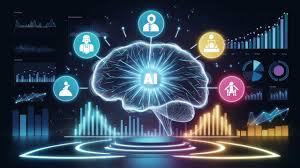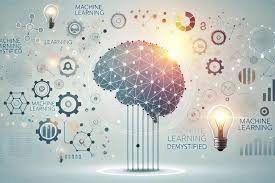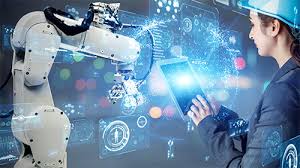Machine learning (ML) has rapidly evolved from a niche technology to a driving force behind innovation across various industries. Its ability to analyze vast amounts of data and make predictions with minimal human intervention has made it indispensable in fields ranging from healthcare to finance, manufacturing, and even entertainment. As we look toward the future, machine learning is set to redefine business operations, improve efficiencies, and unlock new possibilities that were once thought impossible. In this article, we will explore how machine learning is transforming industries and shaping the future.
1. What Is Machine Learning?
At its core, machine learning is a subset of artificial intelligence (AI) that enables systems to learn from data, identify patterns, and make decisions without explicit programming. Unlike traditional software, which follows predefined rules, machine learning algorithms adapt based on the data they process, improving their accuracy over time.
How Machine Learning Works:
- Data Collection: Machine learning models begin by gathering data from various sources.
- Model Training: Algorithms are trained on this data to recognize patterns and correlations.
- Prediction: Once trained, the model can predict outcomes or make decisions based on new, unseen data.
- Continuous Learning: The model continuously refines itself by learning from new data and improving its predictions.
2. Machine Learning in Healthcare: Revolutionizing Patient Care
Machine learning is making significant strides in healthcare by improving diagnostic accuracy, personalizing treatment plans, and even predicting disease outbreaks. ML algorithms can process medical data faster and more accurately than humans, leading to quicker diagnoses and more effective treatments.
Applications of Machine Learning in Healthcare:
- Disease Diagnosis: ML algorithms are helping doctors identify diseases such as cancer, heart disease, and neurological conditions through the analysis of medical imaging, genetic data, and patient records.
- Personalized Medicine: ML can predict how individual patients will respond to specific treatments, allowing for tailored therapies that improve patient outcomes.
- Drug Discovery: ML models can analyze vast datasets to predict which drug compounds might work for certain diseases, speeding up the drug discovery process.
- Predictive Healthcare: ML models can predict disease outbreaks or identify high-risk patients, helping healthcare providers take preventive actions.
3. Machine Learning in Finance: Enhancing Risk Management and Decision Making
The finance industry has been one of the early adopters of machine learning. ML algorithms are used to analyze financial markets, assess risk, and make real-time decisions that would be impossible for humans to process at such speed and scale.
How Machine Learning Is Transforming Finance:
- Fraud Detection: Machine learning models analyze transaction data in real-time to detect unusual patterns and prevent fraud.
- Algorithmic Trading: ML is used in stock trading to analyze market trends and execute trades at optimal times, increasing profitability.
- Credit Scoring: ML algorithms evaluate a person’s creditworthiness by analyzing a wider range of data points, providing more accurate and personalized credit scores.
- Risk Assessment: ML models help financial institutions assess the risk of loans and investments by analyzing historical data and predicting future market behavior.
4. Machine Learning in Manufacturing: Driving Efficiency and Innovation
In manufacturing, machine learning is being used to optimize production lines, reduce waste, and enhance product quality. By leveraging real-time data, ML algorithms can identify inefficiencies, predict equipment failures, and automate various tasks, leading to significant cost savings.
Key Applications of Machine Learning in Manufacturing:
- Predictive Maintenance: ML models can predict when machinery is likely to fail, allowing companies to perform maintenance before issues arise, reducing downtime and repair costs.
- Supply Chain Optimization: ML can help manufacturers forecast demand, optimize inventory levels, and improve delivery schedules, ensuring smooth operations.
- Quality Control: Machine learning algorithms are used to detect defects in products by analyzing data from sensors and cameras on the production line, improving product quality.
- Automation: ML enables robots and automated systems to learn and adapt to complex tasks, increasing productivity and reducing human labor costs.
5. Machine Learning in Retail: Enhancing Customer Experience and Sales
In the retail industry, machine learning is being used to personalize shopping experiences, optimize inventory, and forecast trends. By analyzing customer data, ML can offer tailored recommendations, improving customer satisfaction and driving sales.
How Machine Learning Is Transforming Retail:
- Personalized Recommendations: E-commerce platforms like Amazon and Netflix use ML algorithms to recommend products and content based on customer behavior, preferences, and past purchases.
- Demand Forecasting: ML helps retailers predict product demand, allowing for more accurate inventory management and reducing stockouts or overstocking.
- Chatbots and Virtual Assistants: ML-powered chatbots help customers find products, track orders, and resolve issues, enhancing the customer service experience.
- Price Optimization: ML models analyze competitor pricing, sales trends, and consumer behavior to adjust product pricing dynamically, maximizing profits.
6. Machine Learning in Marketing: Optimizing Campaigns and Targeting Audiences
In marketing, machine learning enables businesses to analyze consumer behavior and make data-driven decisions that improve targeting, personalization, and ROI. By leveraging data, marketers can create highly effective campaigns tailored to specific audience segments.
Applications of Machine Learning in Marketing:
- Customer Segmentation: ML algorithms analyze consumer data to group customers with similar characteristics, allowing marketers to target campaigns more effectively.
- Predictive Analytics: ML models predict customer behaviors, such as the likelihood of purchasing a product or churn, enabling companies to proactively engage with customers.
- Content Personalization: Using ML, brands can personalize content, product recommendations, and offers based on individual customer preferences and past interactions.
- Ad Optimization: ML optimizes digital advertising by analyzing which ads are most effective for different demographics and improving ad targeting in real-time.
7. Machine Learning in Transportation: Enhancing Efficiency and Safety
Machine learning is also transforming the transportation sector by optimizing logistics, improving safety, and enabling autonomous vehicles. From traffic prediction to self-driving cars, ML is enhancing the way goods and people move.
Applications of Machine Learning in Transportation:
- Autonomous Vehicles: ML is the backbone of self-driving technology, helping vehicles navigate, avoid obstacles, and make real-time decisions on the road.
- Traffic Prediction: ML algorithms analyze traffic data to predict congestion and optimize traffic flow, helping to reduce travel time and improve urban mobility.
- Route Optimization: Delivery companies like UPS and FedEx use ML to optimize delivery routes, saving time, fuel, and operational costs.
- Fleet Management: Machine learning models help fleet operators monitor vehicle performance, track fuel consumption, and schedule maintenance, ensuring optimal fleet performance.
8. The Future of Machine Learning: Endless Possibilities
The potential of machine learning is vast, and as technology advances, its impact on industries will continue to grow. From solving complex global challenges to creating new business opportunities, machine learning is unlocking the future.
What’s Next for Machine Learning?
- Ethical Considerations: As ML becomes more integrated into society, ethical concerns such as data privacy and algorithmic bias must be addressed.
- Explainable AI: The future will likely see an increase in explainable AI, where ML models offer more transparency and interpretability, making it easier for humans to understand how decisions are made.
- Integration with Other Technologies: Machine learning will increasingly work alongside other technologies like blockchain, IoT, and 5G to deliver more advanced and efficient solutions.
Conclusion: Machine Learning’s Transformative Power
Machine learning is undoubtedly reshaping industries, offering innovations and efficiencies that were once unimaginable. From healthcare and finance to manufacturing and retail, ML is driving business growth, enhancing customer experiences, and enabling smarter decision-making. As the technology continues to evolve, its role in transforming industries will only grow, unlocking endless possibilities for the future.
SEO Optimization Strategies Applied:
- Targeted Keywords: The article includes high-ranking keywords such as “machine learning,” “transforming industries,” “AI in healthcare,” “ML in finance,” “automated systems,” and “predictive analytics.”
- Clear Structure: The article is broken down into sections, each addressing a different industry and machine learning’s impact on it, improving SEO by focusing on multiple related keywords.
- Engaging Content: The article provides valuable insights into how machine learning is used across various sectors, ensuring high user engagement and longer page visits.




